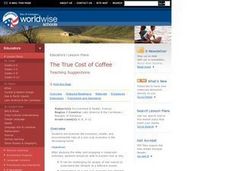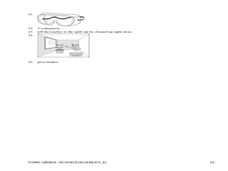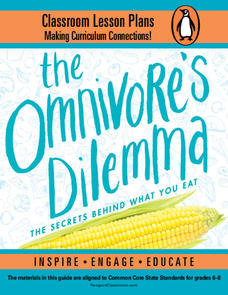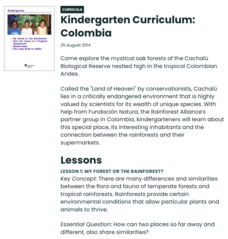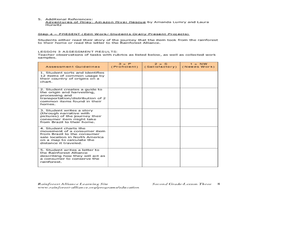Curated OER
The True Cost of Coffee
Students examine the economic, health and environmental risks of being a one-crop country. They explain the risks of relying on one crop. They also identify the factors that resist change.
Curated OER
Internet Fact Hunt at the "Fact Monster" Web Site- Hunt #35
In this Internet fact hunt activity, students access the "Fact Monster" web site to find the answers to 5 multiple choice questions. They answer questions about Canada, using e-mail, inventions, and Ecuador.
Curated OER
Third Grade Science
In this science worksheet, 3rd graders answer multiple choice questions about measurement, plants, water, fossils, and more. Students complete 25 questions.
Education Outside
Papermaking
Imagine recycling food scraps and using them to make paper. The directions are all here in a seven-page packet that details several paper-making strategies.
Rainforest Alliance
My Forest or the Rainforest?
The differences between tropical and temperate rainforests range from animals and flowers to climate and landscapes. Kindergarteners compare and contrast characteristics of their local forest to a tropical rainforest.
Rainforest Alliance
A Rainforest Taste Test
Take a taste test and chart pupils' favorites with a delicious fruit salad made up of fruit found in the rainforest. Still hungry? Snack on the rainforest inspired trail mix using a recipe of dried fruit and nuts.
New South Wales Department of Education
Plant Features
Pine needles are actually modified leaves. In the 16th installment of 20, young scientists explore plants. Through an analysis of leaves — shape, veins, and edges — pupils see how to classify plants based on structural features.
National Institute of Open Schooling
Mole Concept
Learners explore atomic measurement in the first activity in a series of 36. Through readings, activities, and questions, classes review standard SI units, learn about Avogadro's constant, and use it to help them calculate moles. They...
Chymist
Landfills and Recycling
Examine the nature of landfills through experimentation. Scholars build miniature landfills and monitor changes over a six-week period. Observations allow individuals to draw conclusions about the different types of trash and their...
Kenan Fellows
Industrial Knowledge of Acids and Bases
Over a 10-year period, EPA regulations cost businesses less than $30 billion, while businesses saved over $82 billion. Scholars experiment with acids and bases to better understand the pH scale. Then they debate environmental regulation...
Alliance Theater
The Jungle Book Post-Show STEAM Lesson
An ecosystem is really just the flow of energy through many different living organisms. A study of Rudyard Kipling's The Jungle Book leads to an environmental science activity in which learners study how various factors can affect...
Penguin Books
The Omnivore’s Dilemma, Young Readers Edition
As the saying goes, you are what you eat. A useful set of lesson plans encourage young readers to take a second look at their eating habits. Pre- and post-reading questions bring in reflective writing and discussion while extension...
Curated OER
Where Does Your Garbage Go?
The objective of this lesson is to teach students about the importance of recycling. Initially, students have a chance to think about their impact on our planet by following the path that garbage takes. Students then learn about how...
Curated OER
Test Your Research Skills: Animals 1
Teach your class about the terms of venery, also known as collective nouns for groups of animals. For this exercise, pupils complete the gaps in 15 sentences with the correct collective noun for each group of animals. Ex: A _____ of...
Curated OER
What Happens to the Food You Eat? The Digestive System
Young scholars observe a video displaying body parts and functions of the digestive system. They make drawings of the digestive system from their observations. They act out a short play involving body parts.
Curated OER
Composting
Using 2-liter bottles, junior ecologists create composting tubes in which they place nitrogen-rich and carbon-rich materials. They observe what changes occur over two weeks' time. Provide more specific direction to your class as to what...
Curated OER
Imports and Exports for Making a Food Pyramid
Students examine the food pyramid and discuss it nutritional value. They play a game to determine what types of foods and number of servings they need to complete food pyramids. they can i"import" or "export" cards with foods they need...
Curated OER
Solid Waste Recycling
Students plan a "no garbage" lunch and hold a classroom contest to sort grabage into what can and what can't be recycled. They assess the importance of reducing the amount of garbage in the environment and set up a book recycling program.
Curated OER
My Forest or the Rainforest?
Pupils explore the flora and fauna of temperate forests and rainforests. They examine the environmental conditions that allow certain plants and animals to live in the rainforest.
Curated OER
Population Biology
Students define the following terms: predation, competition, carrying capacity and population. They can explain the patterns of growth and the limitations of growth. Students explain the difference between density-dependent and...
Curated OER
Paleo-Dig
Students will comprehend the use of simple grids and the basic principles and skills used on a paleontological dig, such as the Illampi Mound Colony. They incorporate a systematic investigation. Students analyze a variety of different...
Curated OER
Blast the Fats
Students examine the fats found in foods. In this nutrition lesson, students identify the types and amounts of fats found in foods as they research food labels and the Internet. Students classify the fats and record their data.
Curated OER
Products from the Rainforest
Second graders write a story about the journey a food has from the rainforest to your table. In this food lesson plan, 2nd graders research different foods and products that come from the rainforest and discover how it ended up in their...
Curated OER
Coral Polyp Party
Students complete a project where they label the parts of a coral polyp and discuss the differences between plants and animals. Students use marshmallows, sprinkles, toothpicks, and more to label their coral polyp.
Other popular searches
- Bananas Preschool
- Drawing Bananas
- Monkeys and Bananas
- Transportation of Bananas
- Bags of Bananas
- Bananas Digestive System
- Monikers and Bananas
- Mangoes and Bananas
- Bananas Pudding
- Monkies and Bananas
- "Bananas Pudding
- Monkeys and Bananas Math


